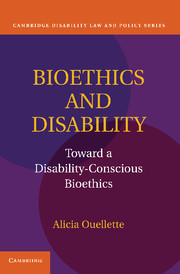Introduction
Published online by Cambridge University Press: 07 June 2011
Summary
As an appellate attorney working in the new york State Attorney General's office, I was assigned a case that involved an adult woman with profound physical and mental disabilities. The woman was terminally ill and unable to digest any food or water. After consulting with her doctors, her family requested that she be allowed to die without being provided any further nutrition or hydration, which could be administered – if at all – through an intravenous catheter. Although the provision of nutrition and hydration would extend her life, the treatment would not change the fact that she was dying. Instead, it would increase her pain through an extended dying process. Everyone directly involved in the woman's medical case – the doctors, family, and ethics consultants – agreed the plan for palliative care and the termination of the intravenous nutrition and hydration was in the patient's best interest. In most states, the treatment plan would have been carried out and the patient allowed to die peacefully in a matter of days. Because the patient was in a New York State hospital, however, and because she had never had capacity to express her own wishes with respect to end-of-life treatment, the case ended in litigation, which prolonged her life for several excruciating months.
At the time, New York law did not permit family members or doctors to withhold nutrition or hydration from a person who never had the capacity to make her own decisions.
- Type
- Chapter
- Information
- Bioethics and DisabilityToward a Disability-Conscious Bioethics, pp. 1 - 11Publisher: Cambridge University PressPrint publication year: 2011
References
- 3
- Cited by

